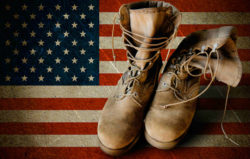Top Class Actions’s website and social media posts use affiliate links. If you make a purchase using such links, we may receive a commission, but it will not result in any additional charges to you. Please review our Affiliate Link Disclosure for more information.

This also extends to surviving family members of a servicemember who was killed by such a weapon as an EFP bomb.
Information obtained by the Defense Department (DoD) has revealed that many EFP bombs, IEDs and IRAMs used during conflicts in the Middle East and Southwest Asia were manufactured in Iran and supplied by Iranian operatives. These activities were funded by a number of international banking institutions, some of which have already reached settlements with U.S. plaintiffs.
EFP Bombs, IEDs and Other Weapons
According to military reports, the weapons Iranians furnished were of three main types:
- EFP: An abbreviation for “Explosively Formed Penetrators,” these are armor-piercing projectiles that are easily concealed and are accurate at over 300 feet. A story in the New York Times described them as “the most lethal weapon American forces faced in Iraq.”
- IED: The “Improvised Explosive Device” is a type of land mine that is deployed along roadsides. These weapons were responsible for up to two-thirds of all casualties sustained by coalition forces in the region.
- IRAM: This stands for “Improvised Rocket Assisted Munition.” Sometimes known simply as a “RAM,” this weapon is essentially a miniature missile with a warhead. IRAMs are made by fixing a propane tank to a small rocket, which can then be fired from the back of a truck and/or launched remotely.
According to a report published in the U.K. Telegraph in 2006, a large number of IEDs and EFP bombs were manufactured in Iranian factories. Five years later, Admiral Mike Mullen, Chairman of the Joint Chiefs of Staff under President Obama, provided intelligence confirming that these weapons were being supplied to Shiite terrorists with the full knowledge of high-level officials in Tehran.
International Banks Help Iran Avoid Sanctions
In 1995, U.S. lawmakers under President Clinton expanded sanctions against Iran that had been in place since 1987. The sanctions included any and all companies who had dealings with Tehran, including banks and insurance companies and the arms industry.
Nonetheless, there were international banking interests that were willing to put potential profits ahead of the law. These banks, which include the Commerzbank A.G. of Germany, France’s BNP Paribas S.A., and HSBS Holding Group in the U.K., were able to find ways to bypass sanctions.
Those banks have since admitted to their activities and have settled cases brought against them by the U.S. government. Other banking institutions that have entered into settlements include:
- Barclays Plc. (U.K.)
- Crédit Suisse AG and Crédit Suisse Asset Management Ltd. (Switzerland)
- Standard Chartered Bank Plc. (U.K.)
Federal Law Gives Americans the Right to Sue
In 2013, Congress expanded the Anti-Terrorism Act of 1997 to include liability on the part of banks and other financial institutions found guilty to have financed terrorist groups and their activities. 18 U.S. Code § 2333 states:
“Any national of the United States injured in his or her person, property, or business by reason of an act of international terrorism, or his or her estate, survivors, or heirs, may sue therefore in any appropriate district court of the United States and shall recover threefold the damages he or she sustains and the cost of the suit, including attorney’s fees.”
If you or a loved one was injured or killed by an IED or EFP while fighting in the Iraq or Afghanistan wars, legal recourse is available. Get help now by filling out the form on this page for a FREE case evaluation.
The attorneys who work with Top Class Actions will contact you if you qualify to let you know if an individual lawsuit or anti-terrorist class action lawsuit is best for you. (In general, anti-terrorist lawsuits are filed individually by each plaintiff and are not class actions.) After you fill out the form, the attorneys who work with Top Class Actions will contact you if you qualify to let you know if an individual lawsuit or class action lawsuit is best for you. Hurry — statutes of limitations may apply.
ATTORNEY ADVERTISING
Top Class Actions is a Proud Member of the American Bar Association
LEGAL INFORMATION IS NOT LEGAL ADVICE
Top Class Actions Legal Statement
©2008 – 2024 Top Class Actions® LLC
Various Trademarks held by their respective owners
This website is not intended for viewing or usage by European Union citizens.
Get Help – It’s Free
Join a Free Iranian IED, EFP Lawsuit Investigation
If you qualify, an attorney will contact you to discuss the details of your potential case at no charge to you.
PLEASE NOTE: If you want to participate in this investigation, it is imperative that you reply to the law firm if they call or email you. Failing to do so may result in you not getting signed up as a client or getting you dropped as a client.
Email any problems with this form to questions@topclassactions.com.
Oops! We could not locate your form.












